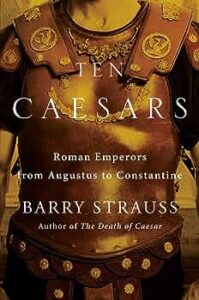Ten Caesars (Mar. 26)
Ten Caesars
Lecture Date: March 26, 2024

Ten Caesars is the story of the Roman Empire from rise to reinvention, from Augustus, who founded the empire, to Constantine, who made it Christian and moved the capital east to Constantinople.
The empire reached from modern-day Britain to Iraq. By the fourth century, the time of Constantine, the Roman Empire had changed so dramatically in geography, ethnicity, religion, and culture that it would have been virtually unrecognizable to Augustus.
In the imperial era Roman women—mothers, wives, mistresses—had substantial influence over the emperors, and we will meet some of the most important among them, from Livia, Augustus’s wife, to Helena, Constantine’s mother. But even women in the imperial family faced limits and the emperors often forced them to marry or divorce for purely political reasons.
Rome’s legacy remains today in so many ways, from language, law, and architecture to the seat of the Roman Catholic Church. Strauss examines this enduring heritage through the lives of the men who shaped it: Augustus, Tiberius, Nero, Vespasian, Trajan, Hadrian, Marcus Aurelius, Septimius Severus, Diocletian and Constantine. Over the ages, they learned to maintain the family business—the government of an empire—by adapting when necessary and always persevering no matter the cost.
Other Sources
-
Augustus: from Republic to Empire by
ISBN: 9781784917807Publication Date: 2018-02-28Augustus: From Republic to Empire is the product of a conference entitled AUGUSTUS. 23 September 63 BC - 19 August 14 AD - 2000 years of divinity organised on 12 December 2014 by the Institute of Archaeology of the Jagiellonian University, the Centre for Comparative Studies of Civilisations at the Jagiellonian University and the National Museum in Krakow. The conference was hosted by the Emeryk Hutten- Czapski Museum - a branch of the National Museum in Krakow - and commemorated the anniversary of Augustus's death. The volume offers readers articles that deal with a variety of topics ranging from architecture, urban issues and painting to fine art represented by glyptics and numismatics. It includes papers devoted to the publication of previously unknown objects, articles presenting iconographic research, deliberations on propaganda, and analyses of the political situation and source texts. Chronologically, some of the papers go beyond the age of August, yet are relevant to the understanding of the transformations that took place in art and architecture during the reign of the first princeps, the widely-understood middle and late periods of the Republic, and the early Empire. The geographic scope of the articles covers the entire territory of the Empire. This diverse topic allows a variety of research themes on the epoch of August to be presented from a broad perspective. -
Augustus by
Call Number: DG279 .J64 1971ISBN: 0393043282Publication Date: 1971-01-01 -
The Age of Augustus by
Call Number: DG279 .E2513 2003ISBN: 0631229574Publication Date: 2002-12-09In this concise biography, Professor Werner Eck, one of the world's leading experts on the Roman empire, tells the extraordinary story of Augustus, Rome's first emperor. A concise and gripping account of Augustus and his age. Written by one of the world's foremost experts on the Roman Empire. Examines the transformation of Rome from a republic to a monarchy. Covers domestic and foreign policy, constitutional developments, and cultural achievements. Compares Augustus' own account of his life to other historical narratives and archaeological records. Includes a new translation of Augustus' Res Gestae with a short introduction and a substantial bibliography to aid further study. -
Tiberius by
Call Number: DG282 .S43 2005ISBN: 0470775416Publication Date: 2008-04-15Robin Seager has updated his classic biography of Tiberius, which focuses on the Emperor's complex character as the key to understanding his reign. The most readable account available of the life of Tiberius, the second Roman emperor. Argues that Tiberius' character provides the key to understanding his reign. Portrays Tiberius as a man whose virtues and beliefs were corrupted by power. Shows how Tiberius' fears of conspiracy and assassination caused him to lose his grasp of reality. A new afterword discusses important new evidence that has come to light on the reign of Tiberius. -
Tiberius Caesar by
Call Number: DG282 .S46 1992ISBN: 0203625021Publication Date: 2004-08-17Taking into account the latest research on the subject, David Shotter has updated this second edition of Tiberius Caesar throughout and provides a concise and accessible survey of the character and life of Tiberius Caesar, heir of Augustus Caesar and emperor of Rome from AD 14 to AD 37. Tiberius Caesar sheds light on many aspects of the reign of this enigmatic emperor, including the influential and often problematic relationships Tiberius maintained with the senate, his heir Germanicus and Sejanus. Other key topics discussed include: * Tiberius's rise to power * Tiberius's struggle to meet the demands of his role * how far Tiberius's policies differed from those of Augustus * why Tiberius retired from official duties in AD 26. Also included is a revised and expanded bibliography and a new index, all of which, added together, makes for an invaluable book in the study of Roman history. -
-
Nero by
Call Number: DG285 .S535 2005ISBN: 0415319412Publication Date: 2005-05-19The reign of Nero is often judged to be the embodiment of the extravagance and the corruption that have, for many, come to symbolise ancient Rome. David Shotter provides a reassessment of this view in this accessible introduction to Nero, emperor of Rome from 54 to 68 AD. All the major issues are discussed including: * Nero's early life and accession to power * Nero's perception of himself * Nero's domestic and international policies * the reasons for Nero's fall from power and its aftermath. This new edition has been revised throughout to take account of recent research in the field. -
Nero by
Call Number: DG285 .C53 2003ISBN: 0674011929Publication Date: 2003-10-21The Roman emperor Nero is remembered as the vain and immoral monster who fiddled while Rome burned. He murdered his younger brother and rival to the throne. He then murdered his mother, with whom he may have slept. He killed his pregnant wife in a fit of rage, then castrated and married a young freedman because he resembled her. Without seeking to rehabilitate Nero, Champlin reinterprets his enormities on their own terms, as the self-conscious performances of an imperial actor with a formidable grasp of Roman history and mythology.
Speaker: Barry Straus
Speaker: Barry Straus

Barry Straus is Bryce and Edith M. Bowmar Professor in Humanistic Studies at Cornell University, and the Corliss Page Dean Visiting Fellow at the Hoover Institution. He is the author of The War that made the Roman Empire: Antony, Cleopatra, and Octavian at Actium, Ten Caesars: Roman Emperors from Augustus to Constantine, and a range of other best-selling books. His books have been translated into twenty languages. He completed his Doctorate at Yale University and his Bachelor’s degree at Cornell.
